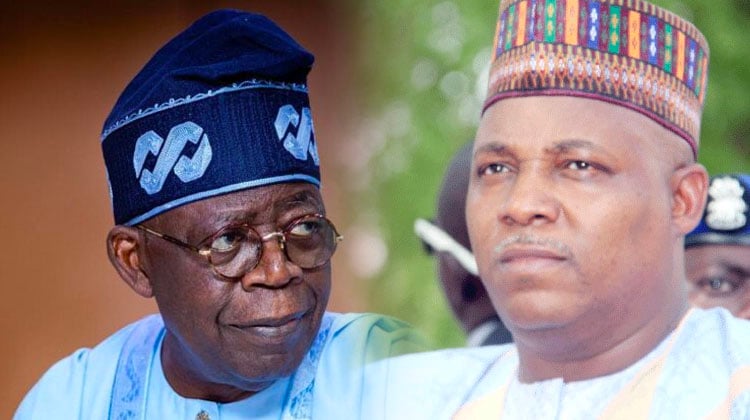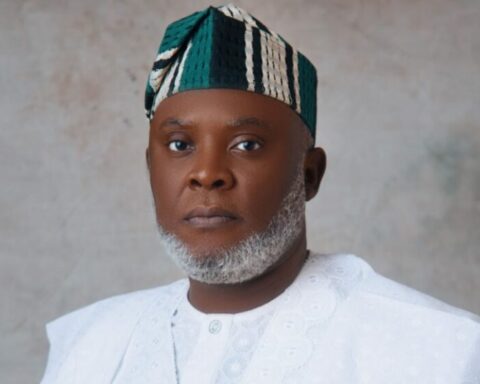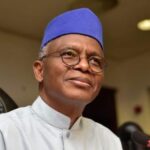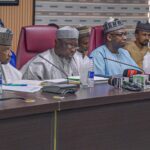By Citizen Bolaji O. Akinyemi
Apostle & Nation Builder
This is an advisory note to a nation in despair, led by men who carry on as if nothing is wrong, when the hope they promised still seems far — very far — if it is even on its way at all. I write in sorrow, not in hatred.
I write as a citizen who has chosen to build, not to burn. Let this be understood as a forewarning, not a threat. I mean no harm.
By this time tomorrow — Monday, 27 October 2025 — the economic posture of Nigeria may quietly shift in a way that touches our rights, our identity, and even our future as one nation under one Constitution.
At the Banquet Hall of the State House, President Asiwaju Bola Ahmed Tinubu and Vice President Kashim Shettima will host invited guests to unveil a new national economic framework titled: “Nigeria National Halal Economy Strategy: A Pathway to a $1 Trillion Economy.” Not a private business fair. Not an industry roundtable. A national strategy. Without debate in the National Assembly.
Without constitutional clarity. Without emotional sensitivity to a nation already on edge. Who will be in the room? We will soon see. But we can already predict the choreography. The same “Christian representatives” who appeared at the Iftar table last Ramadan to bless the optics of religious harmony will likely be presented again — to calm nerves, to sell the Halal vision, to tell the public that there is nothing to fear. We already know this script.
I bear them no grudge. I only ask: is Nigeria now governed by optics or by law? Because tomorrow is not just about trade. Tomorrow is about the soul of the Republic. ––– 1. Prelude: When Faith Becomes Policy Mr. President, this mandate is yours.
In the heat of the campaign, and even on the floor of the National Assembly, lawmakers themselves broke into a chorus history has never given to any other Nigerian leader: “On your mandate we shall stand, Bola! On your mandate we shall stand.” Sir, no President in our history has been so openly serenaded by parliamentarians. That song was not just praise; it was trust. It was Nigeria saying, “We will swallow fear and believe you.”
But leadership has moments when even a good intention, if badly timed or badly framed, can set fire to the house you are trying to rebuild. The launch of a “Nigeria National Halal Economy Strategy” — under a Muslim-Muslim presidency, in a season of open Christian grief — is exactly such a moment. Let us pause and ask a painful question: Is economic ambition worth national fracture? Because timing speaks. Symbolism speaks. Venue speaks. And silence where there should be compassion also speaks.
The Halal economy idea, on paper, aims to tap into the multi-trillion-dollar global Halal market and position Nigeria for export, investment, and credibility in Muslim-majority markets. That is what the Vice President has been championing — a place for Nigeria in a global system that rewards Halal compliance with access and capital. No problem with that in theory.
But here is the wound: you are launching this as a national pathway, not a niche export window, at a time when Christians across this country are still burying their dead, still counting bodies from attacks that are openly described in church circles as religious persecution and, in some quarters, even as genocide. So I must ask, sir — and I ask with respect: How can a government that has not yet declared a National Christian Community Protection Plan declare a National Halal Economy Strategy? When did commerce become more urgent than blood? ––– 2.
Halal, Explained in Plain Language Let us remove the fog. “Halal” is an Arabic word.
It means “permissible,” “allowed,” “lawful.” Under Islam. Under Sharia. Anything not Halal is “Haram” — forbidden.
Halal goes beyond food. It covers: how animals are slaughtered, whether alcohol is present, whether a business deal involves interest (riba), whether a transaction looks like gambling or manipulation, how modesty and morality are expressed in public-facing products.
In other words, a Halal economy is an economy whose goods, services, banking, logistics, branding, tourism, pharmaceuticals, cosmetics, and trade practices are all filtered through Islamic compliance rules. Now, is that wrong for Muslims? Absolutely not.
In fact, Muslims are entitled — morally and constitutionally — to live according to their faith, do business according to their faith, eat according to their faith, and export according to their faith.
That is freedom of religion. A decent nation must protect that. In Muslim-majority countries like Malaysia, Indonesia, Saudi Arabia, UAE, and Pakistan, Halal is not just branding — it is national policy.
The state defines what is Halal, enforces it, certifies it, and markets it to the world, because those states are built openly on Islamic foundations. But Nigeria is not Saudi Arabia. Nigeria is not Malaysia. Nigeria is not an Islamic state.
Nigeria is a multi-faith federation. Nigeria is also a country where the Constitution — Section 10 — says the government of the Federation or of any State shall not adopt any religion as State religion. That is our guardrail. That is the rope holding this fragile tent together.
So let us reason together: When the Federal Government of Nigeria describes Halal — a Sharia-grounded framework — as a “national pathway to prosperity,” is that still export positioning… or is that quiet state endorsement of an Islamic model as Nigeria’s future? And if it is the latter, has Section 10 not just been touched? And if Section 10 is touched, is the peace of this country not being touched? ––– 3. Boko Haram, Memory, and the Meaning of “No Haram” Your Excellency, we cannot pretend amnesia.
You know, and your Vice President certainly knows, that Boko Haram declared war on “haram”. The very name “Boko Haram” was built on the claim that Western-style education — “boko,” book — is forbidden, “haram.” Their stated ideology was to erase what they called haram systems (schools, governance, gender freedom, certain laws) and replace them with an order that is, in their mind, purified — acceptable — Halal. Do we still remember the 2014 abduction of 276 girls from Government Girls Secondary School, Chibok — a predominantly Christian community in Borno State — under the watch of the then Governor, now Vice President Kashim Shettima? Those girls were not just kidnapped, they were ideologically targeted. They were trophies in a war between what terrorists called “haram society” and what they wanted to impose as “Halal society.”
So let us ask a sobering question out loud: When the Federal Government now elevates “Halal” as the new national economic language, have we thought carefully about the trauma this word carries in the Christian subconscious in the North-East and the Middle Belt? Are we telling the wounded, “Don’t worry, this Halal is for export,” while using, in Aso Rock, the same religious vocabulary that terrorists used to justify their slaughter and abduction? Perception is not a small thing. Perception is national security. ––– 4.
The Timing: A Dangerous Symbolism We must confront the reality of today. Your administration, Mr. President, came in on what Nigerians call the Muslim-Muslim ticket. You appealed to Nigerians to trust you — to believe that your government would not become a platform for religious imbalance.
Many Christians — sometimes reluctantly, sometimes painfully — said, “Let us give him benefit of doubt.” But what is the mood now? Christian communities in Plateau, Benue, Southern Kaduna, Taraba and other flashpoints are weeping over killings they interpret as religiously targeted. Churches have been burned. Pastors have been executed. Families have been displaced.
Widows and orphans are now statistics. Ask yourself, sir: Has this government ever, with the same Presidential energy that it is now investing in Halal, declared a National Programme for the Protection of Christian Communities Under Attack? That programme does not exist. Instead, what exists now is a plan to roll out Halal — loudly, nationally, ceremonially, from the very heart of power.
So what message reaches the streets? “The Federal Government may not act to protect Christians from slaughter, but it is ready to act to promote Islamic-aligned commercial systems.” Even if that is not what you intend, that is how it lands.
And in a fragile federation, how it lands is what explodes. ––– 5. The Constitutional and Civic Risks Let us move from emotion to law, because this is not just about feelings; it is about federal legitimacy.
Section 10 of the 1999 Constitution (as amended) forbids the Federation or a State from adopting any religion as a State religion. Section 38 protects freedom of thought, conscience, and religion, including the right to manifest and practice that religion.
Now consider these questions: If federal agencies, ministries, ports, export zones, or funding windows begin to insist on Halal certification as the gold standard, is the state not quietly elevating Islamic compliance to a national benchmark? If public funds are used to build Halal infrastructure as a “national pathway,” is that not the Federal Government privileging one faith’s commercial code for everyone’s prosperity story? If investors discover that to benefit from certain incentives they must align with Sharia-friendly finance models (no interest, no “haram” lines of business), does that not amount to indirect compulsion? At that point, this is no longer “Muslims practicing Islam.” This is “the Nigerian state mainstreaming Islamic compliance as national policy.” That is unconstitutional.
And if it is unconstitutional, it becomes political. And if it becomes political, it becomes combustible. Let no one deceive you: there will be court challenges. There will be legislative resistance. There will be pulpit mobilization.
There will be regional pushback from the South and Middle Belt. And yes, before 2027, there will be electoral consequences. Is this truly the legacy you want attached to your names — that you pushed the Muslim-Muslim ticket too far, past prudence, past sensitivity, past constitutional safety? Because after a point, sir, “boldness” starts answering a new name: “recklessness.”
And reckless, in a multi-faith federation, eventually answers yet another name: “impeachable.” The National Assembly under Senate President Godswill Akpabio will have to decide, sooner or later, what constitutes a line-crossing offence when policy appears to impose religious norms nationally.
If Halal is rolled out as national doctrine without legislative interrogation, are we not daring the legislature to either submit… or confront? Is that where you want to drag the country — to a crisis between the Crescent and the Mace? ––– 6.
Guidance to My Christian Brothers and Sisters To the Church in Nigeria: let us not answer emotion with violence. That is exactly how nations break. Do not let anybody push you into hatred. Let nobody provoke you into lawlessness so they can label you extremists and silence you. Instead, answer with light, not fire. What must Christians do now?
Understand what “Halal” really is. Don’t fight shadows. Halal means “permissible” under Islamic law. It includes bans on pork, alcohol, gambling, deceptive finance, and interest-based exploitation. It is a moral-economic code within Islam. Know it.
Watch how it is implemented. If it stays as a specialised export strategy to help Nigerian companies sell to Muslim-majority markets, then document that. No problem. But if it creeps into national policy, procurement rules, funding criteria, licensing, and industrial parks as the “Nigerian economic model,” then raise constitutional alarm. Loudly. Publicly. Peacefully.
Demand equal federal urgency for Christian safety. Ask: where is the “National Religious Freedom and Protection of Worshippers Initiative”?Where is the federal rebuilding fund for burned churches and attacked communities? Where are the swift arrests and prosecutions of those who massacre Christian farmers and pastors? If Aso Rock can convene the Halal economy at the Banquet Hall, can it not convene a national security response for believers under attack? 4. Prepare politically for 2027. This is not just about grief.
It is also about succession. Begin to ask now: Will the next presidency restore balance or entrench this tilt? Who will stand with all Nigerians, not just some Nigerians? Who will defend Section 10 and Section 38 with the same energy others are using to defend access to a $1 trillion Halal market? The cross and the crescent are not enemies. But governance must never make one dominant over the other. ––– 7.
Guidance to Muslims of Good Conscience To my Muslim brothers and sisters, I speak with respect: Islam teaches justice. Islam teaches mercy. Islam teaches, “There is no compulsion in religion.” That means: you do not need the state to impose your purity for your purity to be true. Your faith does not need force to prove its power.
It only needs integrity. So ask yourself: Do you really want Halal — a sacred idea — to become a political football? Do you want worldly politicians, desperate for legacy talking points, to wave “Halal” like a flag and then hide behind Islam when the backlash comes? Do you want the faith you love to become accused of economic domination rather than admired for moral discipline? Because that is the risk.
When Halal moves from personal conviction to federal doctrine, from self-discipline to state machinery, Islam is no longer seen as a path of devotion — it is seen as an instrument of supremacy. And that is unfair to Islam. You, too, must speak.
You, too, must insist: Halal should remain a voluntary standard for trade and export, not a compulsory uniform for a whole country that is Christian, Muslim, and traditionalist. A faith that demands justice must never become a shortcut to control. ––– 8.
The Way Forward for the Presidency If this “Nigeria National Halal Economy Strategy” is truly about money, not theology, then the Presidency must act immediately to cool the country:
Clarify scope, in public, in plain language. Say clearly that Halal is being promoted as an export and investment window for access to global Muslim markets — not as the new moral law of the Nigerian economy.
Reaffirm constitutional neutrality. On the record, from the podium: quote Section 10 and Section 38 of the 1999 Constitution.
Say plainly that Nigeria has no state religion and never will. Put that sentence in the communiqué. Do not speak in code. Nigerians are tired of code.
Match economic symbolism with human protection. Announce, in the same breath, a National Programme for the Protection of Worship Centres and Vulnerable Faith Communities. Commit federal funds — the way you are committing federal voice to Halal.
Let the killers of Christians, and the killers of Muslims, and the killers of traditionalists hear one thing for the first time in years: “Your season of impunity is over.”
Broaden consultation. Do not only consult the predictable religious elites who smile at every photo-op. Reach the Christian Association of Nigeria. Reach the Apostolic Round Table. Reach JNI. Reach traditional councils. Reach those whose people are dying, not just those whose collars are starched.
Retire the phrase “National Halal Economy.” Words matter. Call it “Nigeria’s Halal Export Development Strategy,” not “National Halal Economy.” Because once you call it national, you have declared a direction for all.
And once you have declared a direction for all, you have stepped into Section 10. Sir, is a headline worth a constitutional crisis?
Final Admonition: Legacy or Liability? Mr. President, Mr. Vice President, Leadership is not only about GDP.
Leadership is also about national peace, and the emotional safety of citizens who do not share your faith. No trillion-dollar dream will matter if Nigerians do not feel spiritually safe in their own country.
Ask yourself today, before you take that podium tomorrow: Will history remember you as the team that built prosperity, or the team that hardened the religious fault line of Nigeria just to create a talking point? Will you be remembered for defending the Constitution that forbids the state from adopting a religion, or for daring that Constitution in the name of an economic slogan?
Will you be remembered as bridge-builders, or as the administration that pushed the Muslim-Muslim ticket too far? Because after all the speeches, after all the branding, after all the applause in the Banquet Hall fades, one thing will remain: Can every Nigerian still pray without fear? If the answer to that question is not a confident “yes,” then tomorrow’s celebration is not an achievement.
It is a warning. And if you refuse to hear the warning, it may become a crisis.
May wisdom prevail — for your sake, and for Nigeria’s sake. — Citizen Bolaji O. Akinyemi Apostle & Nation Builder


























